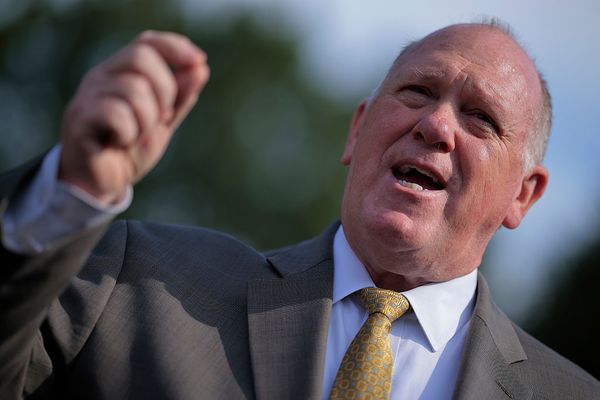
It’s been two-and-a-half years since Todd Muller last held the agriculture role for National. He tells political editor Jo Moir the hopelessness and anger in the rural sector right now is palpable in a way he's never seen before
National’s recently reappointed agriculture spokesperson is determined to find a way to strategically manage water as an asset in a way he says successive governments have failed to do.
“If you had coal in the 19th Century you were rich, if you had oil and gas in the 20th Century you were rich and if you have water then you’re rich in the 21st Century.
“It gives you options and frankly successive governments haven’t been able to appropriately resolve the tension that has existed in the community around how to manage water,” Muller says.
The big issues that need examining, he says, are how to release water for economic potential but also ensure water security and maintain climate change and adaptation options into the future.
“I’ve always had a fundamental view that water is a strategic asset for this country,” he told Newsroom.
Muller has picked up the agriculture role, albeit in an acting capacity for now, after Barbara Kuriger was forced to let go of her portfolios last month for failing to disclose a conflict of interest.
The MP for Bay of Plenty has a reputation for working cross-party, including collaborating with Green Party co-leader and Climate Change Minister James Shaw on the Zero Carbon Act, which is a long-term plan for Parliament to address climate change.
Having last held the agriculture role in 2019, Muller’s respected across the sector where he previously held senior roles at both Fonterra and Zespri before joining Parliament in 2014.
Rural New Zealand reacts
Since taking the portfolio back, Muller has been on the road meeting with farmers and sector leaders in regional New Zealand.
Most recently he held public meetings in Wairarapa, and he says the “feel is very different” this time round.
“I’ve never seen the like of it,” Muller says.
“I’m hearing a sense of hopelessness around the future, and whether it’s worth staying in the sector is extremely palpable. The big change for me that I’ve never seen before is that the message is being articulated by younger farmers.
“You will always get in a group, individuals who are perhaps resisting change, and normally they tend to be people who are more senior than younger, and this is the first time I’ve ever seen it the other way where the anger, frustration and hopelessness is very much the message I’m getting from younger farmers.”
“There’s a real sense that no one’s in their corner, that nothing they do on farm is ever good enough. It doesn’t matter if they’ve done plantings, riparian strips, put in more effluent ponds or set aside bush because it’s the right thing to do." – Todd Muller
Muller describes it as a “cumulative” issue for farmers, whereas in the past often meetings have been focused on a particular issue they’re agitated about.
“Here it’s like a cumulative sense of obligation and criticism and a lack of acknowledgement of everything that’s been done on farm. How complex farm systems are and how interactive they are in terms of their farm animals, various farm practices, the interaction on the environment and trying to measure and mitigate that.
“Trying to work all that out across a myriad of issues, from water quality, to soil, to winter grazing, to climate - they feel overwhelmed actually and that’s hugely striking and quite shocking when the faces who are telling me that are under 40.”
Muller says that group is usually the energetic ones who are prepared to make it work.
“Well, there was none of that, it was simply ‘This is impossible’.
“There’s a real sense that no one’s in their corner, that nothing they do on farm is ever good enough. It doesn’t matter if they’ve done plantings, riparian strips, put in more effluent ponds or set aside bush because it’s the right thing to do.
“Nothing seems to be acknowledged or rewarded or supported - you’ve still got some clipboard warrior from MfE (Ministry for Environment) coming out, or local government saying, ‘That’s wrong and here’s the penalty’.
“It was absolutely palpable in the room,” he said.
Who is calling the shots on agriculture?
The Government’s response to He Waka Eke Noa - a sector-led partnership plan to tackle agriculture emissions - is also causing stress on the farm, and Muller says his initial job is to “build a genuine relationship from a position of respect and acknowledgement”.
“Part of it is actually accepting that some of this is going to take some time, and I know there are always the critics of the agriculture sector who immediately run to the pulpit and say the sector has always sought to kick the can down the road.
“I fundamentally reject that, and I think the people who say that have never been on a farm and never seen the work farmers have done individually and cumulatively across water quality, soil improvement, reducing erosion, fresh water - they just don’t see all that effort.”
Muller says getting the sector through the process of pricing agriculture emissions requires a genuine partnership.
“That’s why I’m so critical of the Government’s response to He Waka Eke Noa ... they’ve decided they’ve got a better view on how it should be managed, and it doesn’t surprise me the sector is up in arms.
“I’m not signalling in any way that because farmers are so angry, no action is required to continue to look to improve freshwater, improve measurement and mitigation of emissions. But there’s a way of doing it that brings the sector along with you and there’s a way of doing it that makes them feel like second-class citizens, and that’s how they feel at the moment.”
“I’ve been involved with the sector for 25 years, and just seeing the vehemence of the reaction makes it clear the Government has lost the farmers here completely.” – Todd Muller
Muller points to the Government’s response to He Waka Eke Noa as being “silent” on changing the regulatory settings to enable new technology to be trialled and implemented on farm.
“There’s a whole heap of additional work that could be done with the sector around efficient capture of additional sequestration.
“The Ministry for Environment and MPI constantly talk about how difficult all this stuff is, well yeah it is difficult, but it has to happen.
“You can’t run to the taxation lever, which this Government wants to do with vigour, and kick the can down the road.”
Muller suggests there’s “tone-deaf behaviour” at the Cabinet table, given how different the Government’s response to He Waka Eke Noa is to the one worked on by the sector over the past three years.
This goes beyond farmers having “the pip with the Government” and Muller says how deep the anger is has shocked him in recent weeks.
“I’ve been involved with the sector for 25 years, and just seeing the vehemence of the reaction makes it clear the Government has lost the farmers here completely.”
Muller told Newsroom he holds the environment minister responsible for much of the Government’s decision-making, because of a view he believes David Parker unfairly holds.
“He clearly has the better of Agriculture Minister Damien O’Connor in any Cabinet conversation they have on these things because the balance is always skewed toward David Parker’s view of the world, which is frankly, he thinks farmers have got away with it for too long, and in my view that’s an outrageous position to hold.”
O'Connor pushed back on Muller's view telling Newsroom consumers abroad are "increasingly concerned with how their food is produced" and New Zealand "cannot afford to be left behind".
"The work with He Waka Eke Noa to reduce agricultural emissions is part of this effort and we have accepted nearly all of their recommendations," he said.
"The National Party's rhetoric of late takes us backwards and not forwards by suggesting, for instance, we leave carbon sequestration to the oceans. It's been scientifically shown that the oceans are acidifying because of increasing carbon dioxide levels."
Muller says while he has a respectful relationship with Shaw, who alongside O’Connor and the Prime Minister is leading the He Waka Eke Noa work, he doesn’t think that means he should provide Shaw with feedback or try to negotiate or mediate on the issue.
“I respect him a lot but I’m sure he’s hearing the sentiment loud and clear himself.
“The Government’s made their call and I’m saying they need to reset it, and I’m sure James Shaw will be hearing the response from the sector just as loudly,” Muller says.







